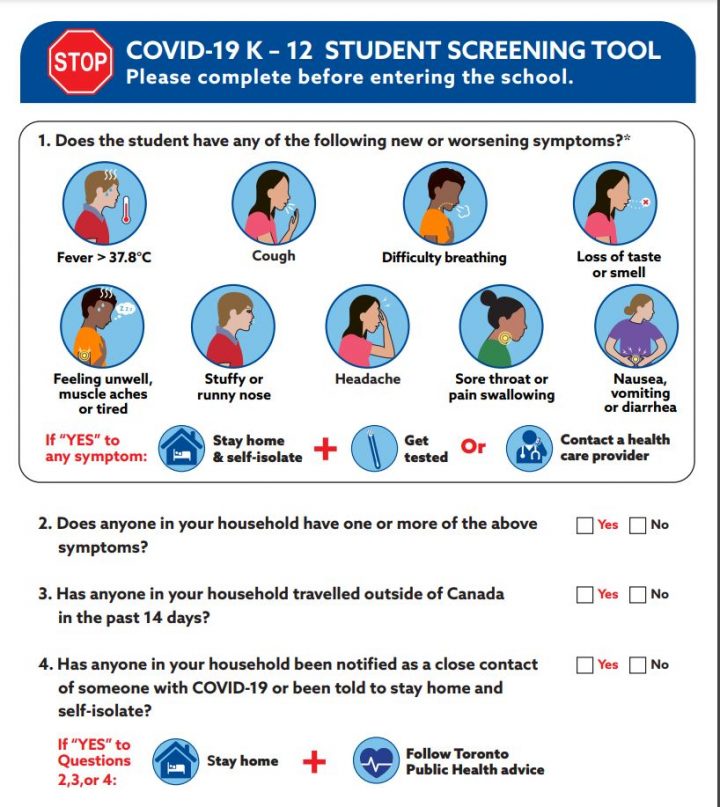Toronto mother Nicole Colacci has had a stressful few weeks.

Her two children tested positive for COVID-19 earlier this month and after 10 days of isolation with mild symptoms were ready to go back to school.
But a caseworker at the Toronto Public Health (TPH) told the family that the children would have to stay home for an additional two weeks and would be able to return to school after the parents completed their 14-day isolation for being a close contact.
The parents’ isolation period is supposed to start at day 10 when the children are deemed non-contagious, they were told.
“It really doesn’t make a whole lot of sense to me that my daughter is going to have to miss potentially a month … of school because of the same illness,” Colacci, 36, told Global News.
“It’s very strange that we’re sort of stuck in a loop.”
A COVID-19 student screening tool used by schools across Toronto has led to confusion and the mixed messaging has only added to the anxiety.
A four-part questionnaire from TPH that is used by the Toronto District School Board (TDSB) as well as daycare centres in the city does not take into account or mention the same outbreak within a family household.
Specifically, question four asks: “Has anyone in your household been notified as a close contact of someone with COVID-19 or been told to stay home and self-isolate?”
If the answer is yes, the children are instructed to stay at home.
This would mean recovered children who are no longer infectious effectively have to re-isolate and miss school for an extended period if their parents or siblings are also isolating in the same house because of being their close contact.
However, in a statement to Global News, TPH spokesperson and associate medical officer of health Vinita Dubey said once a child’s symptoms are mostly resolved and they no longer have a fever, they can return to school after 10 days.
“Parents, caregivers and other members of the household are not able to leave the house to drop the student off at school or leave the house except for medical appointments,” she added.
When a student has been absent from school, TPH also recommends that they complete a Back to School Confirmation Form to explain to the school why they can return safely.
Colacci said the guidelines are “extremely confusing” and the discrepancy needs to be addressed.
“We weren’t really prepared to be locked up for potentially a month,” she said.
“My daughter’s devastated about missing school.”

The document was published in August 2020 before the start of the new school year and was updated last month.
The tool is not entirely consistent with Ontario’s Ministry of Health guidelines, which state that if a previous COVID-19-positive resident is exposed to a case within the same household or cases within an outbreak scenario, then they do not have to re-isolate.
However, the ministry adds that “self-isolation (quarantine) of a previous positive case is recommended for 14 days after a new high-risk exposure to a new unrelated case.”
Experts say there needs be more clarity in the guidelines and protocols.
“Any time that there’s a lack of clarity or where people are concerned, that suggests that there needs to be either additional information provided or possibly rewording of these sort of guidelines,” said Ashleigh Tuite, an infectious disease epidemiologist at the University of Toronto.
Anna Banerji, an infectious disease specialist at the University of Toronto, said it “does not make any sense” that children would have to go back into quarantine because they exposed their parents and the tool should not be interpreted that way.
“If there is confusion, then it should be clarified,” she told Global News.

In Alberta, students who previously tested positive for COVID-19 in the 90 days before being exposed to another case of COVID-19 are not required to quarantine.
According to the screening questionnaire for schools in Newfoundland and Labrador, if someone in the same house is self-isolating and does not have COVID-19 symptoms, staff and students can attend school.
But if there are COVID-19 symptoms, the province recommends seeking public health advice on how to proceed.
Last year, the pandemic forced schools shut across the country. Since January, several provinces in Canada have resumed in-person learning inside classrooms.
In Ontario and elsewhere, a negative test is not a prerequisite for recovered students to rejoin school.
“If the kid … has recovered and it’s been 10 days from when they had COVID, then they can go back (to school),” said Banerji.






Comments